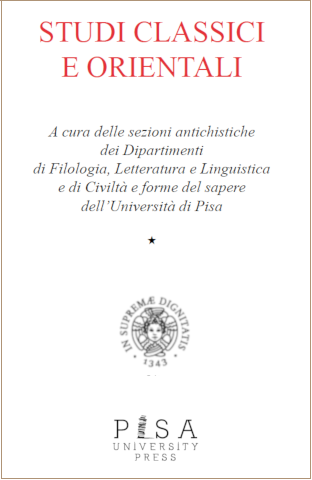L’Italia nella prospettiva romana (III secolo a.C.)
Abstract
Italia in the Roman perspective (III century B.C.)The concept of kinship represents one of the most recurring themes in
Greek and Roman international relationships. As regards the Romans,
modern scholarship has often pointed out the connection between this
concept and the Trojan myth, but the same attention has not been devoted
to the episodes where the Trojan legend of Rome was not involved
as basis of kinship. Actually ancient sources offer clear examples of the
adoption of the idea of kinship in the diplomatic and propagandistic
relationships between Romans and Italians.
The first characteristic of this specific use is the absence of any reference
to the Trojan myth: unlike Greek communities of Greece and
Asia Minor, the Italians claimed their kinship links with the Romans on
totally different ideological basis than the Trojan myth. A second meaningful
element is that while the Italians often claimed to be kindred
of the Romans, the Romans always denied to share any kind of blood
relationship with them. The Italian point of view represents the third
interesting aspect: Italians adopted the idea of kinship just to strengthen
their requests to the Romans, as if kinship was considered by the Romans
a valid reason to satisfy the Italian requests.
The first two chapters of this work explore this complex problem, stressing
the different habits of the Romans and of the Italians concerning the
idea of kinship in their mutual relationship. The analysis of evidence
from Florus, Velleius Paterculus, Appian and from other authors helps
us in outlining the ambiguous Roman habit towards this concept of kinship,
so important from the Italian point of view.
The last chapter (7) of the work stresses the reasons of the alleged kinship
between Romans and Italians. From the Italian point of view, a
common Sabine origin related them to the Romans. We can compare
this attitude to the parallel and contemporary exploitation by the Roman
propaganda of the importance of the Sabines in the history of Rome.
ABSTRACTS
SCO 58 (2012), 339-343
340 abstracts
But there is a significant difference between the Roman and the Italian
exaltation of the Sabine element: while the Italians see in the Sabine
myth the reason of their kinship with the Romans, the Romans, who do
not mention at all any kinship relation, attribute to the Sabines the role
of ethnic common basis of the concept of Italia.
The idea of Italia (and its exploitation) in the Roman diplomatic and
propagandistic language represents two fundamental topics of the work
and contribute in understanding Roman perspective on Italy in the 3rd
century BC (chapters 3-6).
Already at the beginning of the 1st Punic War, the Romans accepted to
help the Mamertines just because they came from Italy. As other literary
sources confirm, in the first half of the 3rd century BC the idea of
Italia began to play an important role in Roman international relationships,
with the king Pyrrhos, as well as the Carthaginians, because it
was now that the Romans started to present Italy as their own sphere
of pertinence. Again in the second half of the same century, Rome exploited
the concept of Italia in order to strengthen the Roman-Italian
front against Hannibal. It is right on this occasion that the Sabine element
was exalted (under different points of view) and presented as the
ethnic ground of Italy.
Briefly, this work shows the ideological importance of the image of Italy
in Rome’s diplomatic relations already at an early stage (first half of
the 3rd cent. and perhaps even earlier, in the late 4th cent. BC), before the
concept of an Italian land took an administrative and religious shape.
russofed@libero.it
Pubblicato
2013-06-13
Fascicolo
Sezione
Articoli


